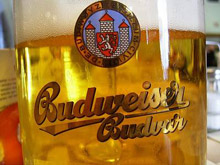 Would the beer world be a better place if Budweiser bought Budweiser?
Would the beer world be a better place if Budweiser bought Budweiser?
Or put another way, would both American-owned Anheuser-Busch and Czech-owned Budejovicky Budvar be better off if A-B bought Budvar?
In the event you didn’t already answer “no” and move on . . .
Evan Rail explains the ins and out of of privatizing (selling) Budvar in his new Beer Culture blog in the Prague Daily Monitor. Then he asks this question:
Yes, I know that sounds like sacrilege to many beer fans. But if Budvar is privatized, can you imagine that anyone other than Anheuser-Busch would end up owning it? And does anyone out there consider for a second that maybe, just maybe, this might be a good thing — and not only in terms of the reduced legal fees for both companies?
We also have we have this view form the A-B side of the ocean. Brew Blog reported Monday that analyst Stifel Nicolaus published a report titled “On BUD’s Takeout Value.”
It asked whether a buyer would pay “more than a typical takeout multiple for BUD.” Absent a bidding war, Stifel’s verdict was no.
Why? Largely because A-B remains underindexed in imports and crafts.
Although A-B distributes Budvar in the United States, where the beer is called Czechvar, that is different than owning the esteemed brewery.
As Brew Blog points out, we heard plenty of rumors about A-B and InBev during 2007. And if (obviously more like when) the dollar continues to struggle in 2008 and InBev’s stock price grows stronger against A-B’s then the possibility of a less-than-friendly takeover increases.
A few months ago, the Budvar-Anheuser-Busch rumor was pretty strong, as noted in this article http://e-malt.com/IndexNews.asp?Email=rgarvin@garvin.us&Id=11476
which contains the fact that A-B owning the brand would save them $25million in legal costs “…more than the total net income of Budejovicky Budvar”. That’s an awful big incentive for A-B to outbid anyone else, seems to me.
Much as I hate to see it happen, I don’t think A-B’s ownership would be any worse than any of the other likely suspects (SABMiller, InBev, Heineken). It’s not as if Fritz Maytag’s gonna be in on the bidding, too.
Evan’s article mentions Sam Adams – maybe he was just having fun with us.
But that would be interesting, don’t you think? Of course, SA’s flagship is a lager. So how about America’s biggest ale brewer, Sierra Nevada?
What’s the over-under on Bud killing Budvar outright? I wouldn’t call it an unthinkably long shot.
20 years ago I think it might have been likely that A-B would have quietly killed the brand if they’d gained ownership somehow. In today’s global market, with so many different segments in the beer market, I think they’d keep it and market it as “Budweiser Classic” or “Original Budweiser” in the US, as their outrightly owned entry in import European Light Lager segment, competing head to head with Heineken, Pilsner Urquell and Stella Artois. If they can have a Budweiser, Budweiser Light, Budweiser Ice, Budweiser Select, Budweiser Brewmasters Reserve, Budweiser Malt Liquor (OK, they dropped that one circa 1975), what’s one more?
jesskidden, i agree. esp since craft brews are bigger and more available, why wouldn’t a newly found beergeek pick up an import if it’s more widely available?
This all amounts to idle speculation, since no less than the Czech Prime Minister, Mirek Topolanek, has stated definitively that “There will be no privatisation.”
Granted, it’s not utterly unheard of for a politician to go back on his word, but from the tone of a recent (though now expired online) article in that selfsame Prague Daily Monitor, the plan-in-progress is to turn the company into a joint public-private entity through a limited stock offering. And even that will take a year and a half to complete.
Can anyone imagine A-B getting involved with Budvar ownership in anything less than a majority position? I can’t.
What’s wrong with a little idle speculation?
Not sure how it ties in, but Starr Hill in Virginia – which brewed only 3,000 barrels in 2006 – and A-B just announced a distribution deal.
FWIW, I also think it’s a longshot that A-B would kill its recently-acquired Budvar. But not an impossibility.
I don’t think they’d kill it straight off, as this would make them unpopular in the beer world. Instead, they’d continue to brand and market them separately, but meanwhile make big cost savings by switching production to one big site. Over the course of five or 10 years, some of the original production methods would be lost (“Do we really need this fancy water? What’s this lagering for 30 days business?) until you’d end up with two outwardly different brands tasting exactly the same.